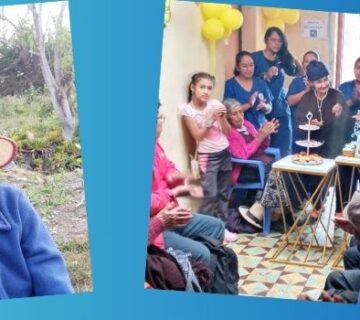People living in the Focolare Movement’s little town of Victoria in Man, Ivory Coast, have shown great tenacity during the pandemic. Covid 19 did not stop the activities of the Health Centre or the Nutritional Centre. The Movement’s extraordinary Communion of Goods has helped to support many people in need.
Monica Padovani is an Italian focolarina, 53 years old, who has lived in Africa for twenty years. She has been working in the little town in Man for two years as a professional educator and activities coordinator at the Focolare’s Supplementary Nutrition Centre (CNSF). Before the pandemic she had shown great courage in rescuing and bringing new life to this project; when covid hit, her ingenuity and boldness enabled it to remain the “beating heart” of the area.. The creation of a workshop for the production of masks which could not be found on the market ensured indispensable services for the sick at the CNSF and the adjoining Medical Centre, and the financial aid received was essential for their continuation..
How has Victoria been affected by this emergency and how has it continued to be a chain of love during this time?
There have been many challenges this year but we are really happy to be able to say that we have overcome many of them. The restrictive measures taken in the country at the beginning of the pandemic made it possible to contain the spread of the disease in the area surrounding the capital, Abidjian. In Man, where our little town is located, the consequences are mainly of an economic and social nature and have unfortunately affected an already fragile situation, making a particular impact on the poorest sectors of the population. Fortunately, the activities of the Health Centre and the Nutrition Centre have continued, albeit at a slower pace, and the aid received has supported various emergency activities, also allowing the employment of an additional nurse. With a strengthened team, cases of child malnutrition have been better addressed, a large number of mothers in need have been supported and concrete responses to the various challenges have been made.
Helping seems to have been your way of “embracing” others. Is there any experience that is particularly close to your heart?
Each case is unique but among the many, the one of the little girl born prematurely was particularly moving. After the birth, the baby weighed just one kg and the parents were referred to a paediatric department with the urgent need for a thermal cot. Due to various difficulties, it was not possible to meet this need and it was at the CNSF that they received first aid. The baby and her mother were helped to feed for the first time and they were assured of a calm and peaceful environment where they could stay warm and be carefully monitored. Thanks to these small gestures, the little girl is healthy; she has gained strength and weight and will soon celebrate her first birthday.
Has the verb ‘to nourish’ taken on new meanings during the pandemic?
The term “nourish”, in our daily experience at CNSF, certainly has a broader meaning. It is certainly about food, prevention and the fight against malnutrition. However, ‘feeding’ is also about giving what that person really needs at that moment, such as advice, encouragement, special attention. That’s what Covid emphasised: more attention to the other person. This is how we have understood that things that are often ‘simple’ in our eyes can be vital for others.
Maria Grazia Berretta


 Italiano
Italiano Español
Español Français
Français Português
Português




Toda mi unidad y apoyo a la misión.